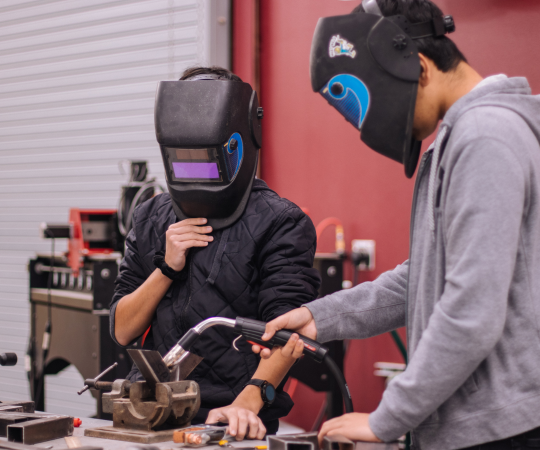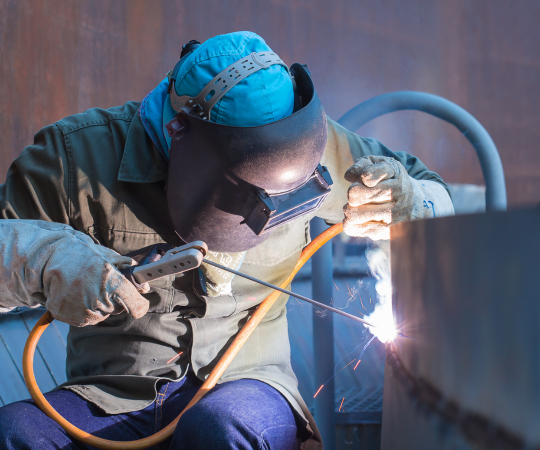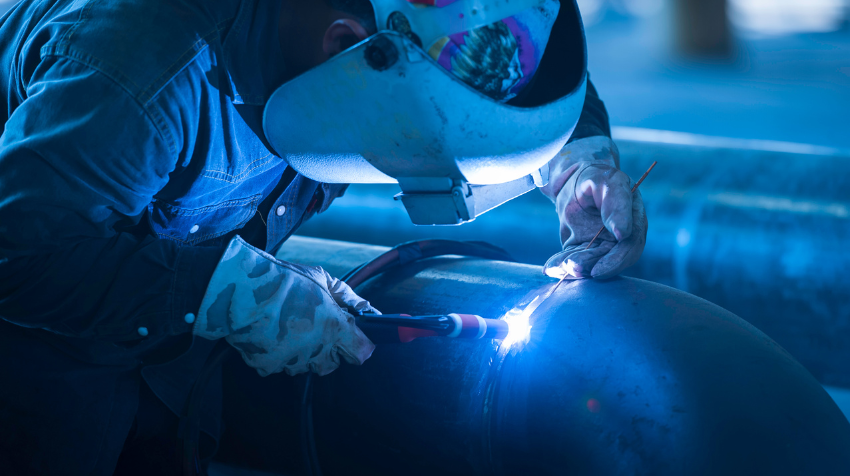Mastering the Welding Career: Expert Advice for Securing Top Job Opportunities
As the saying goes, ‘if you love what you do, you’ll never work a day in your life.’ When it comes to choosing the right welding career, it’s important to identify your interests and passions.
Welding is a versatile skill that can be applied in various industries such as construction, manufacturing, and automotive repair. However, not all welding jobs are created equal.
To land the best jobs in the industry, you need insider tips on how to navigate the job market. This article will provide you with valuable insights on how to choose the right welding career for you and how to position yourself as a top candidate for the best jobs in the field.
From identifying your interests and researching companies to building your skills and networking effectively, these insider tips will help you stand out from other candidates and land your dream job in welding. So whether you’re just starting out or looking to advance your welding career, read on for expert advice on how to excel in this exciting field.
Identify Your Interests
You need to figure out what sparks your interest and dive into it, so you can truly enjoy your work in the welding industry. When choosing a welding career, it’s important to consider both passion and profitability.
While some welders find success in pursuing their personal interests, others prioritize financial stability over their passions. It’s all about finding the balance that works for you.
Finding your niche is key when identifying your interests. Do you prefer working with heavy machinery or intricate designs? Are you interested in building infrastructure or creating art? Balancing personal interests with industry demand can also help guide your decision-making process.
Look at job postings and see what skills are in high demand within the industry. By doing so, you’ll be able to determine which areas of welding align best with both your personal interests and the job market.
Once you’ve identified your interests, it’s time to research companies and industries that align with those passions.
Research Companies and Industries
Take a closer look at the companies and industries that interest you to find the perfect fit for your welding skills. Researching welding industry trends and job prospects is crucial in determining which companies are worth considering.
Look for companies with a strong reputation, stable growth, and potential for long-term employment. In addition to job security, salary expectations and benefits should also be taken into consideration when researching welding jobs. Welders can earn competitive wages with opportunities for advancement within the company.
Some employers also offer benefits such as health insurance, retirement plans, paid time off, and tuition reimbursement for continuing education. Once you have a clear understanding of what each potential employer offers, you can determine if their requirements align with your goals in terms of level of education and certification required.
With this knowledge about researching companies and industries in mind, you can now move on to determining the level of education and certification required to achieve success in your chosen field of welding.

Determine the Level of Education and Certification Required
To determine the level of education and certification required for your chosen welding career, explore different types of welding certifications.
Look into advanced training opportunities and apprenticeships to gain valuable hands-on experience and increase your chances of landing the best jobs.
By taking advantage of these resources, you can position yourself as a highly skilled candidate in the competitive field of welding.
Explore Different Types of Welding Certifications
As you delve into the world of welding, it’s valuable to examine the various certification paths available to ensure that your skills are recognized and that you’re on track for a successful career. Welding certification options range from basic certifications to specialized ones specific to certain types of welding or industries.
Here are three benefits of certification that make it worth considering:
- Recognition: Certification shows employers that you have a certain level of knowledge and skill in welding, making it easier for them to trust your abilities.
- Career Advancement: Many companies require employees to hold certifications before they can move up in their field or take on higher-level projects.
- Personal Development: The process of getting certified requires learning new skills and techniques, which can help you grow as a welder and expand your capabilities.
Exploring different types of certifications is just one aspect of choosing the right welding career path. Consider advanced training and apprenticeships next, which can provide invaluable hands-on experience while also honing your skills further.
Consider Advanced Training and Apprenticeships
If you’re serious about becoming a skilled welder, why not explore advanced training and apprenticeships? There are many benefits to pursuing these options.
For one, apprenticeships provide hands-on experience under the guidance of experienced welders. This allows you to gain practical skills while also building your network in the industry.
Additionally, advanced training options such as specialized courses or certifications can help you stand out in a competitive job market. Taking advantage of these opportunities can lead to higher paying jobs with better benefits and more room for advancement.
However, it’s important to do your research and choose reputable programs that align with your career goals. By investing in yourself through advanced training and apprenticeships, you’ll be positioning yourself for long-term success as a skilled welder.
As you continue on your journey towards becoming a successful welder, it’s important to build your skills and experience. This can involve taking on different types of welding projects or seeking out mentorship from experienced professionals in the field. By consistently pushing yourself to grow and improve, you’ll be well-equipped to handle any challenges that come your way in the welding industry.
Build Your Skills and Experience
If you want to build your skills and experience in welding, there are a few key points that you should keep in mind.
First of all, it’s important to gain hands-on experience through internships and entry-level jobs. This will allow you to get a feel for the industry and develop your skills in a practical setting.
Additionally, it’s crucial to continue learning and improving your skills over time by taking classes or attending workshops.
By following these tips, you can become an expert welder with plenty of knowledge and experience under your belt.
Gain Hands-On Experience through Internships and Entry-Level Jobs
You can gain valuable experience in welding by pursuing top internships and entry-level positions in the industry. These opportunities will allow you to work alongside experienced professionals, learn new techniques, and develop your skills. By gaining hands-on experience, you’ll be able to demonstrate your ability to follow safety protocols, manage equipment, and produce high-quality welds.
Entry-level jobs such as welder’s assistant or apprentice are great starting points for those new to the industry. Internships offer a similar opportunity for students or recent graduates looking to gain practical experience before entering the workforce. Both options provide a chance to learn from seasoned professionals while building your skills and establishing yourself as a competent welder.
With this valuable experience under your belt, you’ll be well-positioned for future job opportunities in welding. As you continue learning and improving your skills, remember that there are always new challenges to tackle and innovations to explore in this dynamic field.
Continue Learning and Improving Your Skills
Keep building your skills and knowledge in welding by staying up-to-date with the latest techniques and innovations, attending workshops and seminars, and seeking out practice opportunities to work on challenging projects. As you gain experience, it’s important to continuously develop your skills through various skill development strategies such as reading industry publications, taking online courses or certifications, and practicing new techniques.
One effective way to continue learning is by seeking feedback from experienced welders who can provide constructive criticism on your technique. Additionally, joining professional organizations or attending industry events can help you network with other professionals in the field and learn about new welding technologies.
By actively seeking out opportunities for growth, you’ll not only improve your job prospects but also become a more skilled and knowledgeable welder overall.
As you continue to hone your skills as a welder, it’s important to also focus on networking and marketing yourself within the industry. This includes developing a strong personal brand that highlights your unique strengths and abilities as a welder. By effectively communicating your value proposition to potential employers or clients, you’ll increase your chances of landing high-quality welding jobs that align with your career goals.

Network and Market Yourself
Networking and promoting yourself can be a game-changer when it comes to advancing your welding path. It’s not just about who you know, but it’s also about who knows you.
Networking strategies like attending industry events, joining professional associations, or volunteering in local welding organizations can help you meet people in the field and create valuable connections. These connections may lead to opportunities for job referrals, mentorship programs, or even business partnerships.
Personal branding is also an important aspect of networking and marketing yourself as a welder. Your personal brand should reflect your skills, experience, and values as a professional welder. Creating a strong online presence through social media platforms like LinkedIn or Instagram can showcase your work and attract potential employers or clients. Having a well-designed portfolio website that highlights your projects and achievements can also make you stand out from other candidates when applying for jobs.
Remember that networking and personal branding require time, effort, and consistency, but they’re worth investing in if you want to advance your welding career. With a strong network and a strong personal brand, you’ll be able to establish yourself as a reliable and skilled welder in the industry. By consistently attending industry events, connecting with other professionals, and showcasing your expertise, you can build a strong reputation that will open up new opportunities for your career. Additionally, it’s important to stay updated on the latest tools and safety equipment in welding, such as through a comprehensive review of welding gloves, to ensure that you are always working at the highest safety standards.
Frequently Asked Questions
What are some common misconceptions about the welding industry?
Misconceptions about the welding industry abound, but it’s important to separate fact from fiction. Many people believe that welding is a dangerous profession with little room for growth and no emphasis on safety. However, safety is of utmost importance in the welding industry, as any experienced welder will tell you.
Despite what some may think, the future of welding education is bright. With new technologies emerging all the time and a growing demand for skilled welders, there are plenty of opportunities for those who want to pursue this career path. So don’t let misconceptions hold you back – learn more about the reality of welding and see if it’s the right fit for you!
How do welding careers differ in terms of salary and job stability?
So, you wanna know about the salary and job stability of welding careers? Well, let me tell you, it’s not all sunshine and rainbows.
In fact, if you’re looking for a career with no growth or demand in the industry, then welding might just be perfect for you! Just kidding.
Welding careers offer great potential for career growth and job stability due to the increasing demand in various industries such as construction, manufacturing, and transportation.
With specialized skills like underwater welding or robotic welding, you can even earn a higher salary than the average welder.
So don’t let anyone tell you that being a welder isn’t worth it – ’cause with hard work and dedication, it definitely is!
What are some unique challenges faced by women and minorities in the welding industry?
Addressing bias and increasing diversity are crucial issues in the welding industry. Women and minorities often face unique challenges, such as experiencing discrimination or feeling isolated in a predominantly male workforce.
To combat this, companies can implement policies that promote inclusion and provide equal opportunities for all employees. Additionally, mentorship programs or support groups can help individuals feel supported and connected within their workplace.
By addressing bias and increasing diversity, the welding industry can create a more welcoming environment that values all employees equally.
How do advancements in technology and automation impact the welding profession?
Are you ready to take your welding skills to the next level? As technology continues to evolve, robotics integration in the welding profession is becoming more common.
This means that welders who can operate and maintain these machines will be in high demand for future job prospects. But don’t worry, this doesn’t mean robots will replace human welders entirely.
Instead, they will work alongside them to increase efficiency and productivity. Embrace these advancements in technology and automation to stay ahead of the game and secure a successful career in welding.
What are some alternative career paths for individuals with welding experience?
If you have welding experience, there are plenty of alternative career paths for you to explore. One option is to become an entrepreneur and start your own welding business. This can be a challenging but rewarding path that allows you to be your own boss and take on projects that interest you.
Another option is to pursue specialized certifications in areas such as inspection or quality control, which can lead to higher-paying positions with more responsibility.
No matter which path you choose, having welding experience gives you valuable skills that are in high demand across many industries.
Conclusion
Congratulations! You’ve successfully navigated through the process of choosing the right welding career. By incorporating these insider tips, you’ve set yourself up for success in landing the best jobs.
As you embark on this exciting journey, remember to stay true to your interests and passions. Research companies and industries thoroughly, determining their level of education and certification required.
Building your skills and experience will not only make you a more desirable candidate but also increase your confidence in the field. Don’t forget to network and market yourself effectively. Utilize all available resources, including social media platforms, industry events, and professional associations.
With hard work and dedication, you can achieve your dream job in the welding industry. By following these steps, you’re now equipped with valuable knowledge that will help steer you towards a fulfilling career path.
Keep an open mind and continue to learn as much as possible while enjoying this rewarding profession!
Related Source

